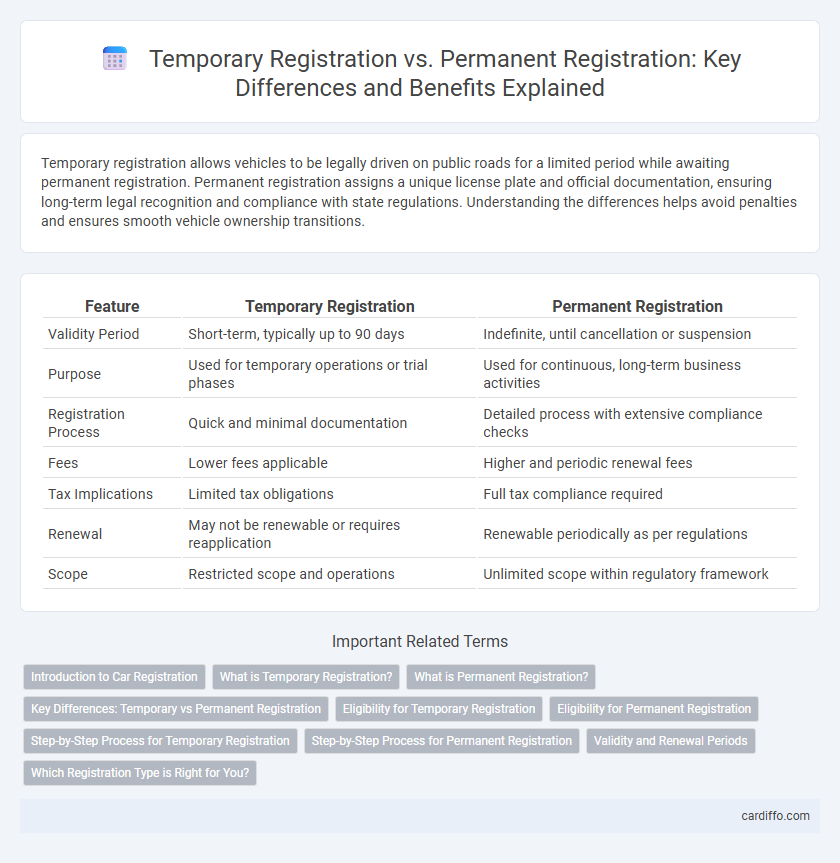Temporary registration allows vehicles to be legally driven on public roads for a limited period while awaiting permanent registration. Permanent registration assigns a unique license plate and official documentation, ensuring long-term legal recognition and compliance with state regulations. Understanding the differences helps avoid penalties and ensures smooth vehicle ownership transitions.
Table of Comparison
| Feature | Temporary Registration | Permanent Registration |
|---|---|---|
| Validity Period | Short-term, typically up to 90 days | Indefinite, until cancellation or suspension |
| Purpose | Used for temporary operations or trial phases | Used for continuous, long-term business activities |
| Registration Process | Quick and minimal documentation | Detailed process with extensive compliance checks |
| Fees | Lower fees applicable | Higher and periodic renewal fees |
| Tax Implications | Limited tax obligations | Full tax compliance required |
| Renewal | May not be renewable or requires reapplication | Renewable periodically as per regulations |
| Scope | Restricted scope and operations | Unlimited scope within regulatory framework |
Introduction to Car Registration
Temporary registration provides immediate, short-term authorization to operate a vehicle while permanent registration is being processed by the Department of Motor Vehicles (DMV). This initial step allows drivers to legally use the car on public roads during the waiting period for permanent license plates and registration documents. Permanent registration establishes official ownership and must be updated annually or as required by state laws to ensure compliance with vehicle regulations.
What is Temporary Registration?
Temporary registration provides a short-term authorization for vehicles to be legally driven while awaiting permanent registration processing. It typically includes a temporary license plate and is valid for a limited period, ensuring compliance with registration laws before full documentation is issued. This type of registration facilitates the immediate use of new or used vehicles during the administrative period required by motor vehicle departments.
What is Permanent Registration?
Permanent registration is the official process of recording ownership of a vehicle with the relevant government authority for an indefinite period. It provides legal recognition, enabling the vehicle owner to receive a permanent registration certificate (RC), which is essential for lawful use and transfer of the vehicle. Unlike temporary registration, permanent registration ensures long-term identification and compliance with motor vehicle regulations.
Key Differences: Temporary vs Permanent Registration
Temporary registration offers a limited validity period, often used for new vehicles or while permanent documentation is processed, whereas permanent registration provides long-term, legal vehicle identification essential for ownership and usage. Temporary registration typically requires less documentation and is easier to obtain but does not grant full legal ownership rights, unlike permanent registration that necessitates comprehensive paperwork and verification. The key differences include validity duration, legal status, and documentation requirements, reflecting their distinct purposes in vehicle registration processes.
Eligibility for Temporary Registration
Temporary registration eligibility primarily targets individuals or entities awaiting the completion of formal documentation for permanent registration. Applicants typically must demonstrate a valid reason for temporary status, such as pending verification or incomplete application processes, and meet specific regulatory criteria set by the issuing authority. Temporary registration ensures provisional legal recognition while complying with predefined time limits and usage restrictions.
Eligibility for Permanent Registration
Temporary registration is granted immediately for new vehicle owners or unregistered vehicles, allowing legal road use while awaiting permanent registration. Eligibility for permanent registration requires submission of required documents such as proof of identity, address, vehicle insurance, and compliance with safety and emission standards. Permanent registration confirms legal ownership, enabling full vehicle rights, including taxation and transfer of ownership.
Step-by-Step Process for Temporary Registration
Temporary registration involves submitting an application with proof of identity, address, and payment of applicable fees to the relevant authority. The process includes verification of documents, issuance of a temporary registration number, and activation within a stipulated time frame, usually valid for a limited period such as 30 or 90 days. This step-by-step procedure enables immediate legal compliance while awaiting permanent registration, which requires more detailed documentation and inspection.
Step-by-Step Process for Permanent Registration
Permanent registration begins by submitting the required documents, including proof of identity, address, and payment of applicable fees, to the relevant authority or online portal. Following document verification, an inspection or appointment may be scheduled to validate the application details. Upon successful verification and clearance, a permanent registration certificate or number is issued, completing the process.
Validity and Renewal Periods
Temporary registration permits vehicle use for a limited duration, typically 30 to 90 days, allowing time to obtain permanent registration. Permanent registration offers long-term validity, usually ranging from one to five years, depending on regional regulations, and requires renewal upon expiration. Renewal periods for permanent registration often include inspection or fee payment to ensure continued compliance with legal standards.
Which Registration Type is Right for You?
Temporary registration suits individuals requiring short-term vehicle use, such as during vehicle transfer or awaiting permanent plates. Permanent registration is ideal for long-term ownership, offering full legal recognition and access to all vehicle-related services. Assess your ownership duration and legal needs to determine the most appropriate registration type for your situation.
Temporary Registration vs Permanent Registration Infographic

 cardiffo.com
cardiffo.com